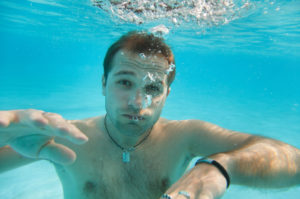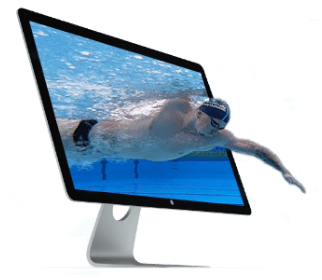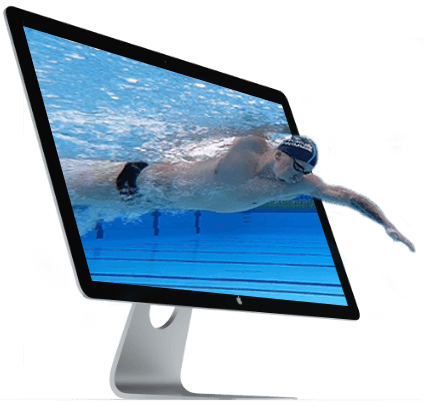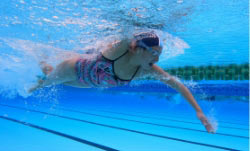If you’ve ever wondered why some swimmers could challenge a fish in a breath-holding competition, and others can’t hold their breath long enough to say the word ‘fish’, this might be the most important article you ever read.

Imagine swimming at a faster pace for longer because you learned a simple exercise you could easily practice as you trained. This is my goal with this article.
There are three things in swimming which affect your oxygen levels. They are:
- Technique
- Lung capacity
- Mindset
They may not sound like your usual factors. Let’s take a look at them.
Technique
In swimming, it’s important you have your swimming technique right. If you’re inefficient, you make a lot of splash and have an untidy technique you’ll lose breath quickly. On the hand, if your technique is smooth, balanced and controlled you’ll be able to manage your oxygen levels easily. Here’s an example:
Last week I challenged my swimmers to swim as far as they could without taking a breath. You’ll never believe what happened next.
Of the 18 swimmers who tried, only 3 made it the entire 50 meters. The other 15 didn’t make it past 30 meters. How could there be such a drop off?
The difference was their technique.
The swimmers who made it 50 meters were able to minimise their kick (which uses most of your oxygen), stay balanced in the water and sit themselves high in the water. The others were doing the opposite of these things.
Lung Capacity
To suck in more oxygen with each breath, it stands to reason that the bigger your lung capacity, the more oxygen you can get.
My favorite exercise to increase lung capacity is to do breath control swimming. This is when you breath every X strokes per lap. Stay with me on this because it can have a big impact on your swimming.
For example, if you are swimming 200 meters in a 50 meter pool, try breath every 3 strokes on the first lap, every 5 strokes the second lap, every 3 stroke the third and every 7 strokes the final lap. If you’re new to this it may be difficult to get to 7 strokes, so some practice will be needed.
The most my swimmers can do is breathing every 11 or 12 strokes if they only swim 50 meters of it. Start of with breathing every 5 strokes to push yourself, and build up as you get more comfortable. Some of the swimming workouts I’ve included in Effortless Swimming workouts use this type of breath control.
Mindset
Mindset plays a big role in swimming, even though it’s rarely spoken about. It’s even more true when it’s comes to breath control. Because it’s such a mental battle when you run out of oxygen, your lungs are screaming for a breath and any second you feel you could black out. In reality, we give up much earlier than we need to. We tell ourselves we must breath or won’t be able to continue. That’s crap.
I’ve come to realise we can usually push ourselves much more than we let on. The human body is an amazing thing. It’s not going to let anything happen to you when it comes to holding your breath.
Focus your mind on other things, ‘switch it off’ so to speak. Go inside your mind and relax as you go through the breath control exercises.
*******************
To increase your lung capacity it comes down to improving your technique, working on the drills to expand your lungs and being able to control your mental state. Practice these things and you should find yourself swimming longer distances with less effort. It’s an important part of swimming which I heard Australia’s head coach Leigh Nugent speak highly about. Try the exercises in your next session.



At age 80 I find it difficult if I do not breathe every stroke….do you think it is actuallly possible to increase lung capacity at my age?
Hi William,
I thinks it’s definitely possible to improve your ability to control your breath, which means you can swim for longer without needing a breath, and when you do get tired you can still swim with good technique. I have swimmers of a similar age who have gone from breathing every 3 at most, to every 7 when we practice these drills.
It just takes focused practice 🙂
Brent
hi
i want a program 2 increase the fitness 2 acheves 5 km without rest
thanks alot
How far can you swim right now? The steps to swimmer longer distances is:
1. Get your technique right
2. Build up your distance each session, and break it up with 100’s, 200’s, 400’s etc.
I have recently purchased a Ironman Power Breathe for my husband who also has emphysema. He was complaining about breathlessness. It was originally developed in the UK for elite sport people. It has proved so successful inassisting people with their breathing that it is on the PBS. It has been scientifically proven to have remarkarble results. My husband is already singing its praises after two weeks!!! No there are no chemicals!!! Check out the website, it will be the best thing you ever did!!
What do you do when your heart is pounding like it’s trying to burst?
@ Therese – Yes the power lungs are great lung training. You can even do it watching TV 😉
@Larry – Relax, lengthen your stroke and make sure you control your breathing
I swim breathing every 5 strokes as an exercise, it is possible to swim very fast in this way, but I will follow the advice given on using this exercise to increase lung capacity.
And to admsman – the front crawl can feel like walking if you swim at a pace that is right for you- you can swim, and swim taking deep breaths rich in oxygen, you will stop swimming not because you are tired but because you become bored. But you have to exercise to be able to do this.
When breathing, should I try to get as much air as possible, or just take a regular relaxed breath?
Hi Eric,
Stay relaxed but fill your lungs with air quickly.
See this video http://www.youtube.com/watch?v=KiN-ylVXb1o
I have only started to swim recently and have been having problem breathing, thanks for this very useful article. I will try the breathing technique and what’s written here and hopefully I can increase not just my lung capacity, but also improve my confidence in the pool to eventually go to open water.
Thanks!
HI:
I have a question: I do martial arts , namely jiu jitsu which requires me to have a good amount of air capacity for short amount of time.
see here: http://www.youtube.com/watch?v=BRX956-SCy4
Now , what excercise, other than what you suggest, should I do to increase my overall oxigen intake for a match? short laps, long laps and which style? Thanks !
If you can email me, it would be great, thanks
Luigi
Get one of these: Powerlung Sport
Can I decrease my stomach by swimming?
Can I decrease the size of my tummy by swimming?
@ nagarajan and sunilkumar,
I played soccer and after the season ended i decided to get into swimming, i thought i was in shape before from playing soccer but swimming challenges all of your muscles, because your muscles need oxygen to work and you’re using limited amounts of oxygen when you swim. i’ve slimmed down and built more muscle just in the past few weeks swimming every day. It’ll slim you down and tone you up, also getting you in great shape
im new to swim practice, and everyone on my team is a lot better than me. im really slow, and i run out of energy really fast. any way to use less energy and go farther?
I am new to swimming and your website has helped me tremendously. I struggle with my flutter kicks. I use a flutter board, my arms are fully extended, my head is in the water with my face looking down and I kick my legs from the thighs, big toes pointed in, knees slightly bent, but I get no where. I literally do not move ahead. What am I doing wrong?
thanks i have been swimming for 9 years and this really helped me learn how to help my lung capacity!!!!!!!!!!
Your video lessons are really helpful. Thank you.
My problem is, I am a sinker & am way too low in the water. After some 15 laps, I start drowning & just can’t pull myself up in the water.
Please help.
Hi Shella,
It could be how your positioning your body in the water. In Mastering Freestyle that’s the first thing we work on. Relaxing and breathing steadily will help.
Great Work done by youuuuuuuuuuuuuu……………….
Wow, this breath control exercise is remarkable! After just 1 session of trying this, albeit with great struggle, I feel I have gone from a timid ‘water scratch-er’ to actual swimming! I recommend this exercise to everyone.
Please tell me if this exercise will help me swim faster.
Also, I am trying to relax more to improve my body position, as recommended by you.Thank you.
I’m surprised that there are no comments for almost a year. I was afraid of the water for 72 years. Finally went to the YMCA here in Cleveland and an instructor first started me floating, then swimming, more or less, across the corner of the pool. Then to the end of the shallow part. Then across the corners in the deep end. She shadowed me for 8 months, once a week, within arms reach. Three times she pulled me out when I panicked. Now I have a more advanced teacher who is changing and refining what the first teacher had me doing. Your videos and explainations seem to amplify what I have been taught. I can see what I have been told but couldn’t conceive as I can’t see what I am doing. My only regret is that swimming does not strengthen bone. Being in water is like zero gravity and bone strength needs to work against gravity so I lift weights and do aerobics.
Hi,
I swim 1000 meters in 25 minutes, breathing every third stroke. Want to cover this distance in 20 mins. Any suggestions on improving the time?
Cheers.
B
i took all the medication which doctor prescribe for me but nothing work out totally but i was able to live with it for the few years tho i still cough all day and seize of breath,i came across a post online which they were discussing how this herbal foundation help them cure their diseases,i was like wow does this really exist so i contacted the herbal foundation immediately so they gave me instruction on how the process goes which i followed exactly,i can proudly say i’m fully cure of copd emphysema without any side effect.
Please do not hesitate to contact them at (totalcureherbalfoundation gmail com)